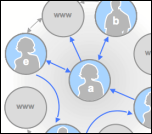Friday, February 1, 2008
Google Releases Social Graph API

Google just released the Social Graph API. Brad Fitzpatrick* in a blog post explains that Google crawls publicly available social network data in the form of XFN (XHTML Friends Network) or FOAF (Friend Of A Friend)**... and then makes this relationship data available via JSON through the API, which you call by simply adding different parameters to a URL. Relationships may be e.g. “John is the Twitter friend of Susan” or “Mary has Peter in her blogroll.” Here’s a link using XFN, for instance:
<a href="http://jeff.example.com" rel="friend met">...</a>
The Social Graph homepage says with this API, developers can “utilize public connections their users have already created in other web services.” Brad says this will enable you as developer to allow your users to bring their existing social connections with them when joining your site so that they will “spend less time rebuilding their social networks.” (Brad also explains things a video.) Google disclaims that the API “returns web addresses of public pages and publicly declared connections between them” but “cannot access non-public information.”
A sample application Google points to is called “My Connections.” It lets you enter URLs to your blogs or profile pages. I entered bradfitz.com and it then listed contacts Brad links to, as well as contacts linking to Brad.
*Last year, Brad on his site posted his “thoughs on the social graph,” which created quite a bit of buzz (and not just because some complained the word “social network” shouldn’t be replaced by the less common term “social graph”).
**I have a FOAF file on this server for ages but never figured someone would want to crawl it!
[Thanks Haochi and Manoj Nahar! Image by Google.]
Update: Macbeach in the comments thinks this is huge news, writing:
Not more useful than OpenSocial, but inextricably tied to it. The idea is to educate users to the fact that most Web companies so far have operated on the walled-garden concept and that Google and a few others are (finally) abandoning that method of holding user’s data hostage for the benefit of either advertisers (or in the case of MSFT for the benefit of extending the Windows monopoly). (...)
Companies opting out of this open exchange of data may do so at their peril, but opting in will require an abandonment of the wall-garden approach, which some of these companies think (wrongly) is essential to their success.
>> More posts
Advertisement
This site unofficially covers Google™ and more with some rights reserved. Join our forum!
